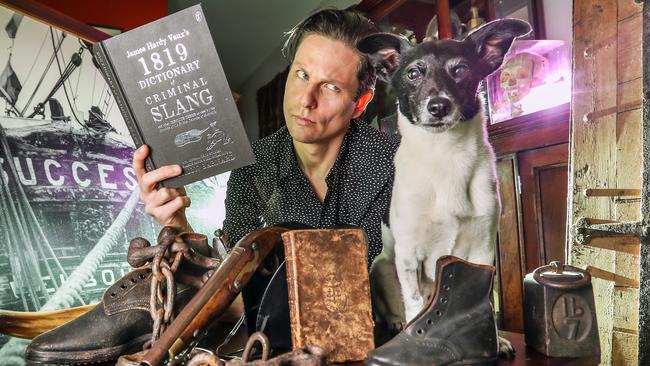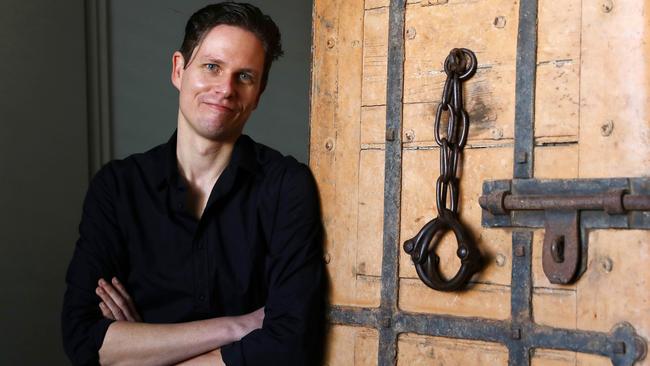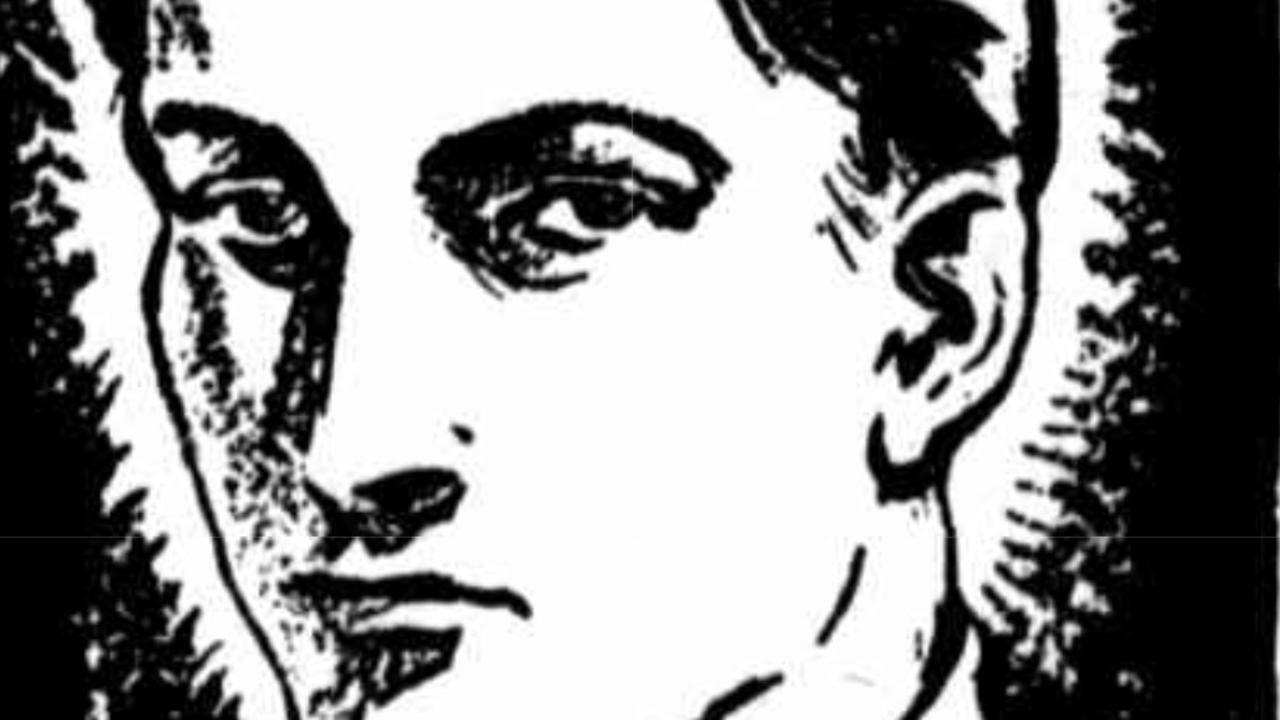The secret language of our loose-lipped criminal ancestors
It’s 1819 and you’ve just been boned by a bum-trap, thrown in ruffles, and brought in front of a beak for knapping a Jacob from a danna-drag. This is the convict slang used by our loose-lipped criminal ancestors. TAKE OUR CONVICT QUIZ.

Our Criminal History
Don't miss out on the headlines from Our Criminal History. Followed categories will be added to My News.
James Hardy Vaux was not your average convict.
Unlike many who made the arduous journey to the penal colony in chains, Vaux — born in 1782 in Surrey — was from a respectable family and was well educated.
But as Melbourne author, artist and collector of colonial artefacts Simon Barnard points out, he had a fatal character flaw.
He just loved committing crimes.
While he could have led a normal, middle-class life, Barnard says Vaux preferred a “rakish life of villainy”.
“He is a funny guy and a wit. He enjoyed being cheeky,” Barnard says.
Vaux — who blew the lid on the language of Australia’s criminal underclass with the nation’s first dictionary published in 1819 called A New and Comprehensive Vocabulary of the Flash Language — was not your unfortunate sent to the colonies for stealing a loaf of bread. Such a problem was Vaux that he was transported from England to Australia three times — in 1801, 1810 and 1831.
Vaux admitted to a convoluted range of crimes including “buzzing, drugging, sneaking, hoisting, pinching, smashing, jumping, spanking, and starring, together with the kid-rig, the letter-racket, the order-racket and the snuff-racket”. (No wonder they needed a dictionary).
“He escaped the gallows and he was a bigamist,” Barnard says of Vaux, one of the 164,000 convicts transported from British and Irish ports to the Australian colonies.
Out this month, Barnard’s James Hardy Vaux’s 1819 Dictionary of Criminal Slang and Other Impolite Terms as used by the Convicts of the British Colonies of Australia re-releases Vaux’s dictionary for its 200th anniversary.
Barnard, whose first book A-Z of Convicts in Van Diemen’s Land, won the Eve Pownall Award for Information Books in the Children’s Book Council of Australia’s Book of the Year awards in 2015, wanted to tell Vaux’s story and share his work when he came across it.
He has also produced the fascinating Convict Tattoos: Marked Men and Women of Australia.
“I found a book on Vaux in a box of books I bought at auction when I was a kid of 13 or 14,” Barnard says.
“I hung onto it and revisited it and couldn’t believe Australia’s first dictionary was compiled by a thrice-transported villain.”
The newly published volume reproduces Vaux’s dictionary in its entirety and Barnard also uses newspapers and other documents of the time to weave in stories of Australia’s early days, illustrated throughout by his striking drawings.
Barnard adds that Vaux’s motivation to write the text was anything but noble. The convicted crim was simply trying to ingratiate himself with his new masters after finding himself imprisoned in the Newcastle penal station in 1812.
As Barnard explains, the magistrates couldn’t understand the coded, arcane world of criminal slang that came before them — a deliberately obtuse language known only to the underclass.
Vaux for his part didn’t seem to mind blowing the lid on this and he even dedicated the book to his station commandant.
Published in England and sent back to Australia, it was a bestseller which found common use in courts. A sale of original volumes seven years ago fetched $US13,750.
Barnard’s volume is full of often surreal yarns of Australia’s early years, all with the weird and wonderful terminology of the time embroidered throughout.
It’s a rollercoaster through the early days of Australia.
For example, it tells the tale of one of Australia’s first prize fights (fought by two “milling-coves” — pugilist in the convict slang, although they could also be known as “fibbing- gloaks”).
The 1817 battle between William Daniel and Robert Lee was fought for the prize of 60 ewes. Unfortunately for Daniel, his eyes were so swollen by the 80th round he had to throw in the towel.
And then there’s the rather blue tale of justice of the peace James Ascough Esquire who was spotted proceeding to “unbutton his kickseys (slang for breeches) and indecently expose his person to the utter disgust of some females”.
Despite two witnesses, the Attorney-General of New South Wales let Ascough off as a man of his social standing “would not, and could not, do such a thing”.
There was even a term for the curious crime of nicking the ladder used by night men who had to lower themselves into cesspits to haul out human refuse with buckets. It was known as “knapping a Jacob from a danna-drag”.
In 1833, William Griffith, another gentleman out on the town, stole a ladder and was caught. He also escaped conviction as he was a “respectable person” who stole the ladder on a “lark”.
There is also the tale of the very busy picklock (or “Betty” in the slang) John Flynn.
After being caught it was discovered his lock picks worked in a range of recently burgled properties.
When police — 27 of them — went to a notorious gambling den in Sydney, they used Flynn’s picks to throw the doors open and arrested everyone.

There was even slang for committing a crime that led to being transported to Australia — this was known as a “lagging matter”.
When notorious pickpocket Mary Cummings was discovered concealing cash in her cleavage, she told her captors: “I suppose I shall be lagged this time”. She was sent to Van Diemen’s Land for seven years.
Or we have George Jones, the bushranging companion of Martin Cash, who was caught after being shot with a buckshot blast to the face. He could not see as his eyes (“lamps”) were severely injured.
“Me lamps is ‘queer’ (sore or weak),” he complained. “Will they scrag (“hang”) a blind cove?”
He was promptly given 100 lashes and executed despite his injuries.
Or we hear the unfortunate tale of the two prize game cocks Bone A Part and Sir Sydney taken by the New South Wales Corps in 1805 as they broke up a cockfight.
To avoid a “poundable” (slang for an inevitably big sporting event) rematch, they served the cooked chooks at the local orphanage.
Vaux was onto something as the slang driven from the underclass became a part of the mainstream.
It became so common that newspapers started printing articles in the criminal argot — too bad for the elites who could not decipher it.
In 1829, British colonial administrator Edward Gibbon Wakefield bluntly said: “The true language of English thieves is becoming the established language of the colony.”
Charles Darwin — after a visit — warned convict women were teaching “vile expressions” to the children of their masters.
READ MORE:
MELBOURNE’S ORIGINAL STYLE INFLUENCER
THE MUM’S GROUP NO PARENTS WANTS TO JOIN
WHY YOUR ‘WORK WIFE’ IS YOUR BEST CAREER MOVE
Barnard points out the language first illuminated by Vaux is still with us.
“Words such as seedy, serve, snitch, snooze, square and stash are now commonplace. Swag is the origin of swagman, and grog still means grog.”
But for Vaux’s part, the publication made him a kind of celebrity, or at least “infamous” the world over.
Barnard says Vaux, despite being dangerous to know, would have been a fascinating person to meet.
“I would have loved to have met him. I think he would have been an amusing, interesting and insightful guy.”
There are notes from a person in Sydney saying Vaux later in life was a “gentleman at large” who “dresses well” and “looked genteelly” but was “still regarded as a suspicious character”.
It appears Vaux never kicked his dastardly ways, although Barnard ruefully notes the convict disappears from history after his release in 1841, when he was 59.
JAMES HARDY VAUX’S 1819 DICTIONARY OF CRIMINAL SLANG AND OTHER IMPOLITE TERMS AS USED BY THE CONVICTS OF THE BRITISH COLONIES OF AUSTRALIA (TEXT, RRP $29.99) IS OUT ON AUGUST 20
Originally published as The secret language of our loose-lipped criminal ancestors


